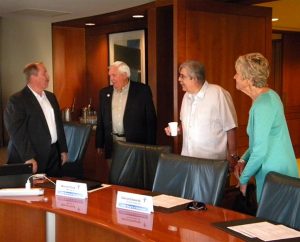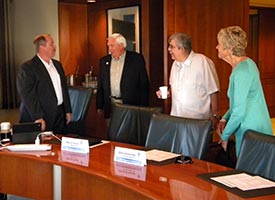By Joe Isenhower Jr.
ST. LOUIS — The Synod’s Board of Directors approved using $50,000 to seed a matching fund to raise additional support for urban and inner-city mission at its Aug. 22 business meeting here.
The relatively short meeting for the Board — when it also took several other actions and heard reports — preceded a two-day triennial retreat that it held. Both took place in a downtown office building.

An allocation of undesignated Mercy/Human Care dollars funds the matching grant. The resolution notes that the grant may stimulate donor-designated gifts and bolster Synod fundraising efforts targeting “the training and support of urban missionaries and the initiation and completion of related community-development projects, helping to provide resources to our districts and congregations for the purpose of bringing Christ to our cities and urban areas.”
The 2013 Synod convention assigned the LCMS Office of National Mission (ONM) in Resolution 3-10A (“To Further Promote Mission Awareness, Support, Collaboration and Coordination for Rural and Small Town, Urban & Inner City and Suburban Ministry”) “to increase significantly the development and coordination of awareness, support and collaboration specific to these areas.”
“Urban & Inner-City Mission [UICM] is working to reverse the trend of losing ground in our cities,” according to the Board’s resolution. It continues that “availability of resources for UICM to train and support urban missionaries and to support community-development projects is essential to making progress in this regard.”
Other actions
In a separate action, the Board authorized creating a “board-designated account” to help the Office of National Mission offset occasional financial losses from conferences the ONM sponsors and “for funding the startup costs of future ONM conferences.”
The funds for the account will be from excess proceeds of registration funds for various conferences that the office sponsors and hosts each year “to further the work of programmatic ministries, expand the reach of its services and encourage collaboration among its ministry partners.”
The Rev. Timothy J. Droegemueller, pastor of Living Faith Lutheran Church in Cumming, Ga., was appointed by the Board of Directors to represent the East-Southeast Region as a member of the Board for National Mission. He fills a vacant “individual-member” position on that board, replacing the Rev. Thomas E. Engler, who accepted a call to a congregation outside that region.
The Board also approved an amendment to the fiscal-year 2015 budget of the Office of International Mission (OIM). That action permits the LCMS to receive up to $3 million in tax-deductible gifts from U.S. donors for construction of a new Urawa Lutheran High School facility operated by the Japan Lutheran Church. The school — a primary center for Gospel outreach in the Tokyo metropolitan area — has outgrown its facility originally built by the LCMS in the 1950s.
Mark Hofman, the Synod’s executive director for Mission Advancement, explained that “the Board’s action treats support of the Urawa project as one of many official international mission projects carried out by the LCMS. OIM is now authorized to disburse donated funds to the Japan partner church as one of its many projects.
“This type of board action was necessary to keep the LCMS and any potential donors in good graces with the IRS,” Hofman said. “In order for a gift to be tax-deductible on a donor’s annual return, it must support the work of a qualifying tax-exempt U.S. nonprofit. This action declares Urawa as important to the Synod’s mission and plan for the 2015 fiscal year, while keeping it contingent on donor-restricted contributions to the LCMS in support of the project.”
In other action, the Board:
- finalized a trusteeship agreement related to property in Hong Kong that is used as a parsonage for the Church of All Nations — an LCMS international congregation there.
- approved distribution of $944,065.06 in surplus funds from those budgeted for the 2013 LCMS convention. Of that surplus total, the board designated $250,000 “to meet costs arising in connection with the 2016 convention,” $494,000 for distribution to LCMS districts and the remainder toward funding “the cost of convention-mandated task forces, study groups, or other activities.”
Reports
Synod President Rev. Dr. Matthew C. Harrison began his report by directing Board members to look through the windows of the meeting room down to the sites where many of the Synod’s Saxon-Lutheran founders landed and worshiped in the city.
He recalled that those “Old Lutherans” were “hated and despised” by many for their confessional stance and that they encountered numerous other difficulties.
“We’ve never been anything but a group of poor sinners whom the Lord has sent mercy upon,” Harrison said as he continued to speak about the “unique and interesting spot” in which the Synod finds itself today.
He mentioned the Synod’s 40-plus years of membership declines, the difficulties of ministry today in an increasingly secular society, the rise of Islam and First-Amendment challenges faced by the church.
“Thank you for who you are,” Harrison told the Board. “The Missouri Synod has gone through unbelievable challenges, and by the grace of God, we are still here. We have many, many strengths. In some ways, we’re stronger than ever before. … So, be of good cheer. What we do suffer as challenges, both personally and as a church body, are purposeful.”
Harrison then spoke of the Synod’s need for “presence” in Washington, D.C., especially with regard to its stances on marriage, First-Amendment issues and life concerns.
Synod Chief Financial Officer Jerald C. Wulf told the Board that the Synod finished the previous fiscal year on June 30 “with a gain in our unrestricted, undesignated net assets of about half a million dollars.” He explained that as a “gain against the deficit” that currently stands at $6,041,000 — down from a deficit of $11,733,000 on June 30, 2010.
He said that gain was “not as big … as in the last couple years, but we’re still pleased with it.”
Wulf also indicated that the Synod had 112 days of operating cash on hand June 30 and is spending 71 cents of every dollar received on programs, which increases to 76.6 cents per dollar if LCMS ecclesiastical services and commissions are included.
He said that since June 30, the Synod has received an income-sharing gift of $51,000 from Concordia Publishing House.
Wulf also said that he received a letter from LCMS English District President Rev. Dr. David P. Stechholz announcing that the district’s Board of Directors has increased its intended support for the Synod by $41,000 and that with the letter was a check for that amount.
Synod First Vice-President Rev. Dr. Herbert C. Mueller Jr. thanked the Board members for their prayers and messages over the last three months since he had open-heart surgery, which he said was successful. He also thanked Harrison for his “pastoral care.” Mueller reported that he “feels great” and was “happy” to return to work at the Synod’s International Center on Aug. 20.
Retreat — time ‘well-spent’
The Board’s retreat, which was in executive session, focused on “The Lutheran Church—Missouri Synod of the future.”
“While the 10-plus hours of retreat only scratched the surface of some topics, the consensus was that the time was well-spent and that it laid the foundation for future conversations,” Synod Chief Administrative Officer Ron Schultz told Reporter. “Many Board members commented on the level and intensity of the collegial discussion.”
Posted Aug. 27, 2014 / Updated Aug. 28, 2015

